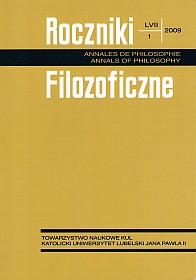Explanatory Filter: Detecting Intelligent Design in the Natural Sciences
Abstract
The main purpose of this paper is to present the concept of explanatory filter as developed by William Dembski, a proponent of intelligent design theory. The explanatory filter is intended as a tool for detecting design, i.e. for discriminating between the results of intelligent and unintelligent activity, in case when the underlying causal history is unknown. Dembski claims that the explanatory filter as a method of design detection is already widely used in various branches of knowledge, although in a pre-theoretic form. His goal is to give the filter a rigorous theoretical shape, as well as to apply it to natural sciences such as cosmology or biology. After outlining the foundations of Dembski’s proposal, various objections to the concept of explanatory filter will be analyzed.
References
Behe M. J.: Czarna skrzynka Darwina. Biochemiczne wyzwanie dla ewolucjonizmu, przeł. D. Sagan, (Biblioteka Filozoficznych Aspektów Genezy, t. 4), Warszawa: Wyd. MEGAS 2008.
Berlinski D.: Has Darwin Met His Match?, „Commentary”, December 2002, no. 5, vol. 114, s. 31-41.
Dembski W. A.: Another Way to Detect Design?, „Access Research Network”, 22 October 2001, http://www.arn.org/docs/dembski/wd_anotherwaytodetectdesign.htm (28.08.2008).
Dembski W. A.: Intelligent Design: The Bridge between Science and Theology, Downers Grove, Ill.: InterVarsity Press 1999.
Dembski W. A.: No Free Lunch: Why Specified Complexity Cannot Be Purchased without Intelligence, Lanham–Boulder–New York–Oxford: Rowman & Littlefield 2002.
Dembski W. A.: Powrót projektu do nauk przyrodniczych, [w:] Teoria inteligentnego projektu – nowe rozumienie naukowości?, red. K. Jodkowski, przeł. D. Sagan, (Biblioteka Filozoficznych Aspektów Genezy, t. 2), Warszawa: Wyd. MEGAS 2007, s. 11-24, http://www.nauka-a-religia.uz.zgora.pl/index.php?action=tekst&id=138 (20.03.2008).
Dembski W. A.: Redesigning Science, [w:] Mere Creation: Science, Faith & Intelligent Design, ed. W. A. Dembski, Downers Grove, Ill.: InterVarsity Press 1998.
Dembski W. A.: Specification: The Pattern That Signifies Intelligence, 15 August 2005, s. 1-41, http://www.designinference.com/documents/2005.06.Specification.pdf (01.09.2008).
Dembski W. A.: The Design Inference: Eliminating Chance through Small Probabilities, „Cambridge Studies in Probability, Induction, and Decision Theory”, Cambridge: Cambridge University Press 1998.
Dembski W. A.: The Design Revolution: Answering the Toughest Questions about Intelligent Design, Downers Grove, Ill.: InterVarsity Press 2004.
Dembski W. A.: The Explanatory Filter: A Three-Part Filter for Understanding How to Separate and Identify Cause from Intelligent Design, 15 November 1998, http://www.arn.org/docs/dembski/ wd_explfilter.htm (29.10.2004).
Dembski W. A.: The Logical Underpinnings of Intelligent Design, [w:] Debating Design: From Darwin to DNA, eds. W. A. Dembski and M. Ruse, Cambridge: Cambridge University Press 2004, s. 311-330, http://www.designinference.com/documents/2002.10.logicalunderpinningsofID.pdf (27.08.2008).
Dembski W. A., Wells J.: The Design of Life: Discovering Signs of Intelligence in Biological Systems, Dallas: Foundation for Thought and Ethics 2008.
Fitelson B., Stephens Ch., Sober E.: How Not to Detect Design – Critical Notice: William A. Dembski, „The Design Inference”, „Philosophy of Science”, September 1999, vol. 66, no. 3, s. 472-488, http://philosophy.wisc.edu/sober/dembski.pdf [27.08.2008]).
Jain A. K., Pankanti S.: Nie tylko odcisk palca, „Świat Nauki” 2008, Numer Specjalny, nr 10 (206), s. 50-53.
Jodkowski K.: Rozpoznawanie genezy: istota sporu ewolucjonizm-kreacjonizm, „Roczniki Filozoficzne” 50 (2002), z. 3, s. 187-198, http://www.nauka-a-religia.uz.zgora.pl/index.php? action=tekst&id=32 (05.10.2008).
Perakh M.: Unintelligent Design, Prometheus Books, Amherst, New York 2004.
Shallit J., Elsberry W.: Playing Games with Probability: Dembski’s Complex Specified Information, [w:] M. Young, T. Edis (eds.), Why Intelligent Design Fails: A Scientific Critique of the New Creationism, New Brunswick, New Jersey, and London: Rutgers University Press 2004, s. 121-138.
Shanks N., Karsai I.: Self-Organization and the Origin of Complexity, [w:] M. Young, T. Edis (eds.), Why Intelligent Design Fails: A Scientific Critique of the New Creationism, New Brunswick, New Jersey, and London: Rutgers University Press 2004, s. 85-106.
Sober E.: Testability, „Proceedings and Addresses of the American Philosophical Association”, November 1999, vol. 73, no. 2, s. 47-76, http://philosophy.wisc.edu/sober/test.pdf (29.02.2008).
Sober E.: The Design Argument, [w:] W. A. Dembski, M. Ruse (eds.), Debating Design: From Darwin to DNA, Cambridge University Press, Cambridge 2004, s. 98-129 (w Internecie znajduje się nieco zmieniona wersja tego artykułu: http://philosophy.wisc.edu/sober/design%20 argument%2011%202004.pdf [29.08.2008]).
Wein R.: Not a Free Lunch But a Box of Chocolates: A Critique of William Dembski’s Book „No Free Lunch”, 23 April 2002, http://www.talkreason.org/articles/choc_nfl.cfm (01.07.2008).
Williams P. S.: The Design Inference from Specified Complexity Defended by Scholars Outside the Intelligent Design Movement: A Critical Review, „Philosophia Christi” 2007, no. 2, vol. 9, s. 407-428, http://www.discovery.org/scripts/viewDB/filesDB-download.php?command= download&id=1491 (07.07.2008).
Woodward T.: Darwin Strikes Back: Defending the Science of Intelligent Design, Baker Books, Grand Rapids, Michigan 2006.
Copyright (c) 2009 Roczniki Filozoficzne

This work is licensed under a Creative Commons Attribution-NonCommercial-NoDerivatives 4.0 International License.





